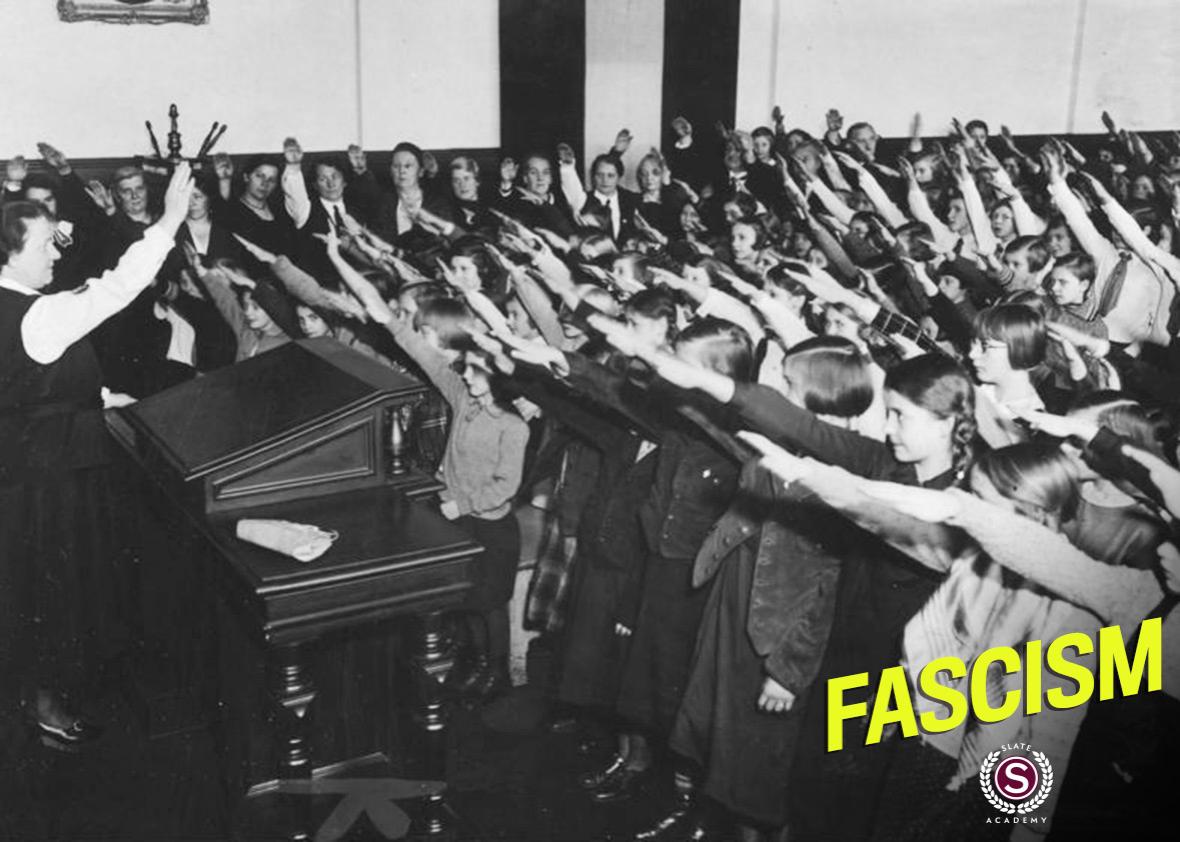To access all features of this Slate Academy series, visit Slate.com/fascism.
As Donald Trump began to gather steam in the Republican primaries last year, he brought the F-word with him. “Is Donald Trump a fascist?” asked many a website, including ours; on Twitter, we played with Trump–Hitler comparisons willy-nilly. As the candidate’s rallies got bigger, his lies more blatant, and his followers’ loyalty more irrational, the F-word was everywhere. And when he won, Merriam-Webster begged its Twitter followers to look up anything but “fascism,” to keep it from becoming the Word of the Year. (“Surreal” ended up the winner.)
But how would you define “fascism”? Those turning to the dictionary for clarification could very well be forgiven. In late November of 2016, the British writer Nick Harkaway, musing on this question, made the point, “When we talk about Fascism, we have to mean more than ‘Things we do not like.’ ” What was it, then? An ideology? A way of governing? A feeling? What made it different from authoritarianism? Was it defined by populism? If so, why did its leaders have such disdain for the people? Was it anti-capitalist or pro-capitalist? If it was inherently nationalist, how could it also have been a global movement? Was it anti-modern, in its embrace of the rural—or technocratic, in its celebration of factories and airplanes?
And, most importantly: Could it be coming back? And if so, how can we defeat it?
My instinct is always to approach a supremely loaded historical question like this one by looking at what actually happened, and by finding out how historians have interpreted those events over the years. So! Welcome to Fascism: A Slate Academy, where we’ll be reading about, and then comparing and discussing, the history of 20th-century fascism in six countries: Italy, Spain, Romania, Britain, the United States, and Germany.
In the first five episodes of this series, we’ll be stepping back from our contemporary context to look at the way fascisms developed across European countries in the interwar period. We’ll be inviting historians who study the countries in question onto the podcast, to help us answer any questions that linger after we do our reading. And in the final episode of the podcast, we’ll bring our new knowledge to bear on the question that started it all: Are we witnessing a rebirth of fascism in 2017?
About your hosts: I’m a Slate staff writer, and I’ve been covering history and culture for the site since we started the Vault blog four years ago. Last year, I hosted another Slate Academy, on the history of American slavery, with my colleague Jamelle Bouie. (Slavery, fascism—I do like to keep it light.) I have a Ph.D in American Studies, have written a book about science and culture in the 20th-century United States, and have always had a special fascination with the 1920s and 1930s, so I’m excited to return to those decades for this podcast. I’ll be picking the readings and guiding the conversations, and in general trying to play the role of your mellowest, most nonauthoritarian seminar leader.
June Thomas, who oversees Slate’s LGBTQ blog Outward and has written about culture and edited foreign coverage for the site for many years, will be one of my co-discussants. Besides her general delightfulness, June brings to the podcast her experience having lived in three of the six countries we’ll be talking about (Spain, Britain, and the United States). Rounding out the group is Josh Keating, a fellow Slate staff writer who specializes in international affairs, and who is writing a book about border issues and the formation of new countries in the post–Cold War era. We’ll be relying on Josh to keep our conversations about global history honest and up-to-date.
As the Academy moves forward, we’ll be posting excerpts and reading lists on its main webpage, and talking about our readings on our Facebook page. We hope you join us as we fill in the gaps in our knowledge of this terrible history and write our own definition of the F-word.
Hear the first episode of this Slate Academy, on fascism’s Italian roots:
